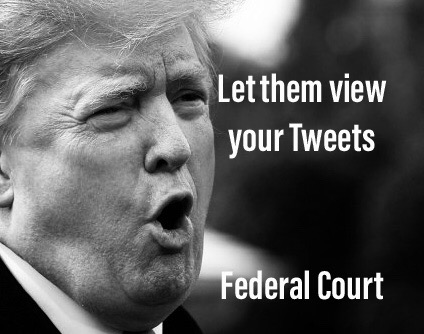Trump can’t wall critics on twitter, what about you?
3 min read
A US federal court has set the argument rolling on the debate (than settling it) over blocking followers on social media handles with its verdict calling President Donald Trump’s walling of his critics on his personal Twitter handle as one which violates the US constitution. In a decision which shows the mirror to the dystopian reality of our lives plugged to digital servers, the court ruled that President Trump blocking his followers on Twitter is unconstitutional and violated the First amendment that calls for more of free speech, than less of it.
The court verdict was given in a case filed by the Knight First Amendment Institute, Columbia University, on behalf of appellants who were allegedly blocked by Trump after they had taken to criticizing his policies.
The ruling in US comes at a time when we are being increasingly reminded of our actions on the cloud and how it precipitates down for the stakeholders, the immediate kin, and for the society at large. In case you have missed, your digital life also comes with rights and responsibilities, and a shelf life, which you can will to a legal heir after your passing away.
In Trump’s case, the federal appeals court upheld the observation of a lower court which returned a similar verdict. The Guardian quoted circuit judge Barrington D Parker who wrote on behalf of a three-judge panel, “The irony in all of this is that we write at a time in the history of this nation when the conduct of our government and its officials is subject to wide-open, robust debate.”
The court ridiculed the attorney arguing on behalf of Trump – the court was told it is a personal handle and that he is tweeting in personal capacity – with this remarkable piece of questioning: Are you seriously urging us to believe that the president is not acting in his official capacity when he is tweeting? In effect, the very observation ignites the debate on the overlapping use of personal account or handle on the social media in professional capacity.
President Trump has a trail of tweets and comments, some direct and bordering on the caustic in vicious attacks he makes on a personal level. A head of the state, no matter, which platform he chooses to address his audience, reflects the thought process of the administration he or she is heading. Trump is no exception, and the court ruling furthers the argument in public domain.
Trump is not an aberration. This belief, after a slew of cases in the recent years, has trickled down to policy-making by the employers and organisations worldwide to define who owns a social media handle of an employee after he or she quits the job. Chances are if you’re joining an industry which involves work that falls under Intellectual Property Rights, the employer’s digital policy will outline the consequences of the actions on your social media handles, including your personal ones. The premise is the same: Your post reflects/affects the company’s standing and might contradict the policy and beliefs it is built on.



